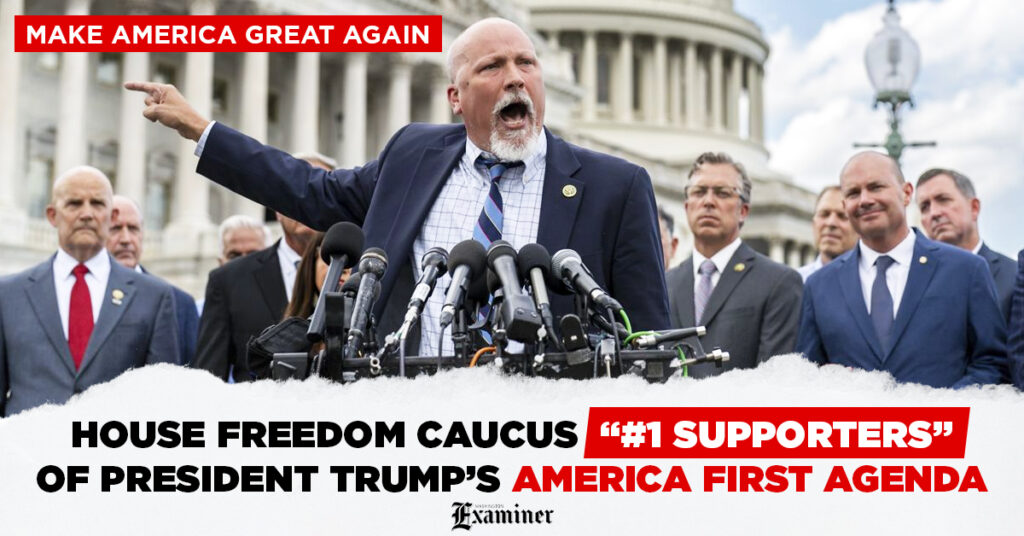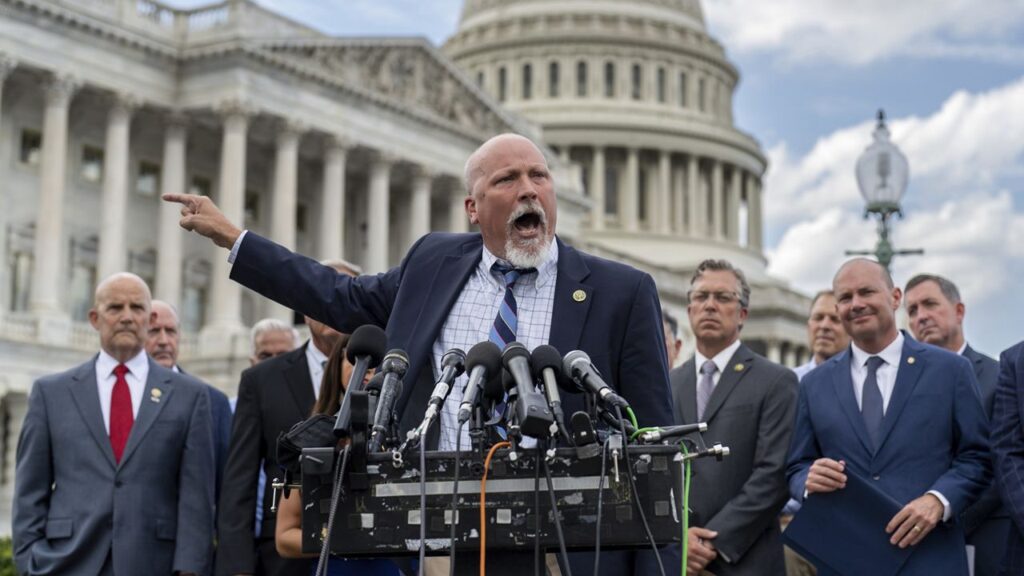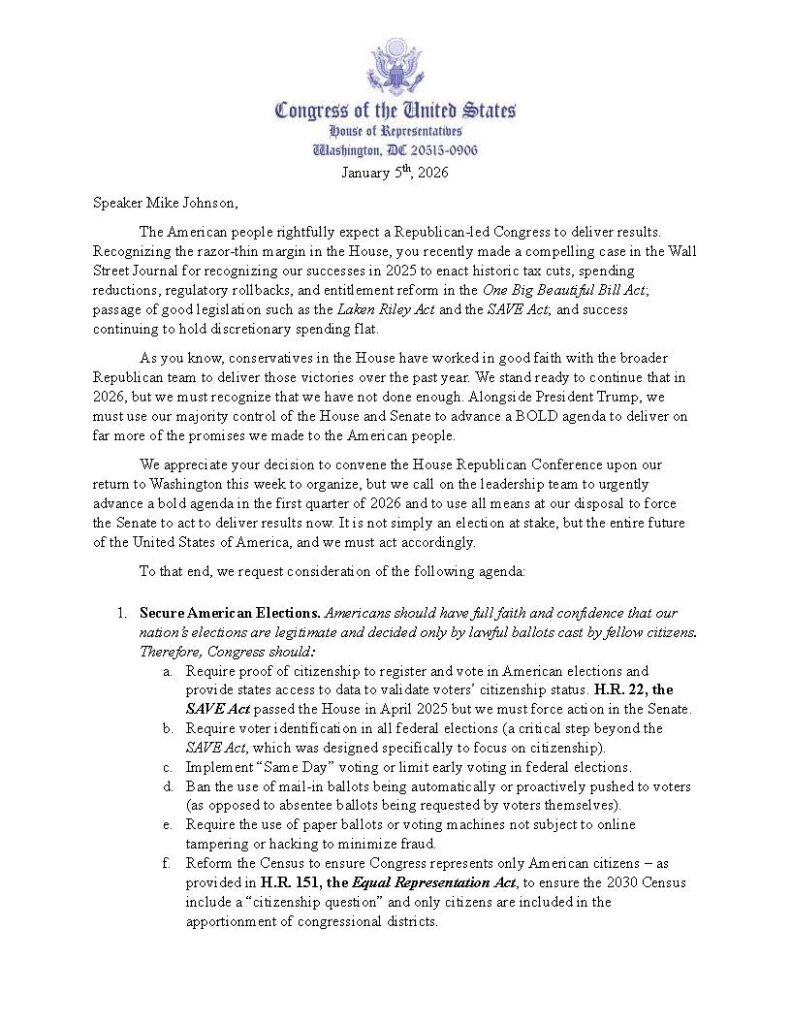
Since its founding 10 years ago, the Freedom Caucus has been called disruptors, extremists, “hardliners,” and a loud minority within the House Republican conference. But the GOP trifecta, paired with a new speaker and fresh blood, has transformed the caucus as a voice for the conservative establishment and a whip for President Donald Trump’s agenda.
In January 2015, nearly a dozen GOP lawmakers founded the Freedom Caucus as a place to discuss policy and conservative values to ultimately refine the way the right flank interacted with senior members.
The “smaller, more cohesive, more agile, and more active” caucus, as then-Chairman Jim Jordan (R-OH) called it at the time of its founding, was not intended to serve as yet another GOP rebellion. But in the 10 years since its founding, the Freedom Caucus has been at the center of party infighting over controversial legislation and compromises with Democrats, often stalling congressional procedures until they get their concessions.
“The House Freedom Caucus was born out of a frustration with overall House leadership and ensuring that there was ample participation by members of the entirety of the body, everybody having a voice and being able to try to shape what we’re doing,” Rep. Chip Roy (R-TX) told the Washington Examiner.
Over the last few years, caucus members have played a role in delaying key votes, ousting a speaker, and holding up the floor to nix fellow GOP lawmakers’ bills.
But that wasn’t always the MO of the Freedom Caucus.
“I joined and wanted to be a part of founding the Freedom Caucus as a place where it was more like a think tank,” Rep. Marlin Stutzman (R-IN) told the Washington Examiner. “We thought through policy. We thought through strategy.”
Starting as a group of a dozen, the caucus now boasts a membership of 30 to 40 Republicans. Famous for keeping their exact numbers and names a secret, most don’t know who, exactly, is a Freedom Caucus member. Some lawmakers are vocal about their membership, while others are discovered by their attendance at a rare caucus-led press conference or bolstering from the caucus’s social media.
Roy, who joined Congress in 2019 and now serves as caucus policy chairman, said he thinks they are “at least as strong as we’ve ever been, if not stronger.”
“It would be hard for me to say that now, 10 years hence, that the Freedom Caucus isn’t very much in stride having an insignificant voice, not an outsized, I think, an appropriately significant voice in the conversation because of the work we’ve done and tried to work with our colleagues,” he said.
[…]
When newcomer Trump demolished the GOP primary field and shocked the world by becoming president, his brash, unconventional ways didn’t always align with the more establishment Republican House, led by then-House Speaker Paul Ryan (R-WI), the running mate to 2012 GOP nominee Mitt Romney.
Trump, however, built inroads in the House through the more rebellious Freedom Caucus group.
“We’re his No. 1 supporter,” Rep. Andrew Clyde (R-GA) said of the Freedom Caucus’s alliance with the president that has only grown over time.
“We know that the ‘Make America Great Again’ agenda, the ‘America First’ agenda, is the right agenda,” Clyde added. “But we have to do it in a fiscally responsible way, which the president has called for, and we’re going to hold the House to that.”
During his first term, two of his chiefs of staff were Freedom Caucus members: former Republican Reps. Mick Mulvaney, who served in an acting basis, and Mark Meadows.
In 2025, the GOP trifecta is back for the first time since its brief stint from 2017-18, during which Republicans passed significant legislation like the 2017 Tax Cuts and Jobs Act. For some members, it’s deja vu, as Republicans are working through reconciliation right now to extend the tax cuts.
But this trifecta comes with a glaring difference: Speaker Mike Johnson (R-LA) holds just a three-seat majority, making it incredibly difficult to pass contentious legislation without the support of both centrist GOP lawmakers and staunch fiscal conservatives.
Stutzman was a founding HFC member who was in Congress from 2010 to 2017. Back in Congress after an eight-year absence, he thinks a razor-thin majority works in the Freedom Caucus’s favor, as it forces leadership to take their opposition seriously.
“Having a small majority is also a difference maker, because you don’t want to lose one vote, and so you have to have everybody,” Stutzman said. “I think that’s actually beneficial to the conference, because if you have too big of a majority, it’s easy to say, ‘Oh, you know what? We’re just gonna ignore those guys.’”
[…]
Since Trump took office, Freedom Caucus members have met with the president or his officials a handful of times, either at Mar-a-Lago or at the White House, to discuss strategies for the budget reconciliation process that will codify Trump’s agenda in one megabill.
The president and the Freedom Caucus have been in lockstep since January. Known as rabblerousers, the Freedom Caucus found a kindred spirit in Trump, who has been heralded as the only man who can “drain the swamp” of Washington and bring back the “Golden Age of America.”
“It’s a pretty good day if we’re being considered establishmentarian, if we’re working alongside President Trump, who has pretty much been a pretty good wrecking crew when it comes to the swamp that we’ve been trying to fight for years,” Roy said.
Still, the caucus gets slapped with an “ultra conservative” label from some media outlets or fellow lawmakers, but Chairman Andy Harris (R-MD) said he laughs it off or, at times, takes pride in it.
“It’s almost the water off the duck’s back now, because it happens so often,” Harris said of the monikers. “We’re used to it. We are conservative, and we make no bones about it.”
Excerpted from the Washington Examiner. Read full article: https://www.washingtonexaminer.com/news/house/3400460/freedom-caucus-10-years-trump-establishment-agenda/

